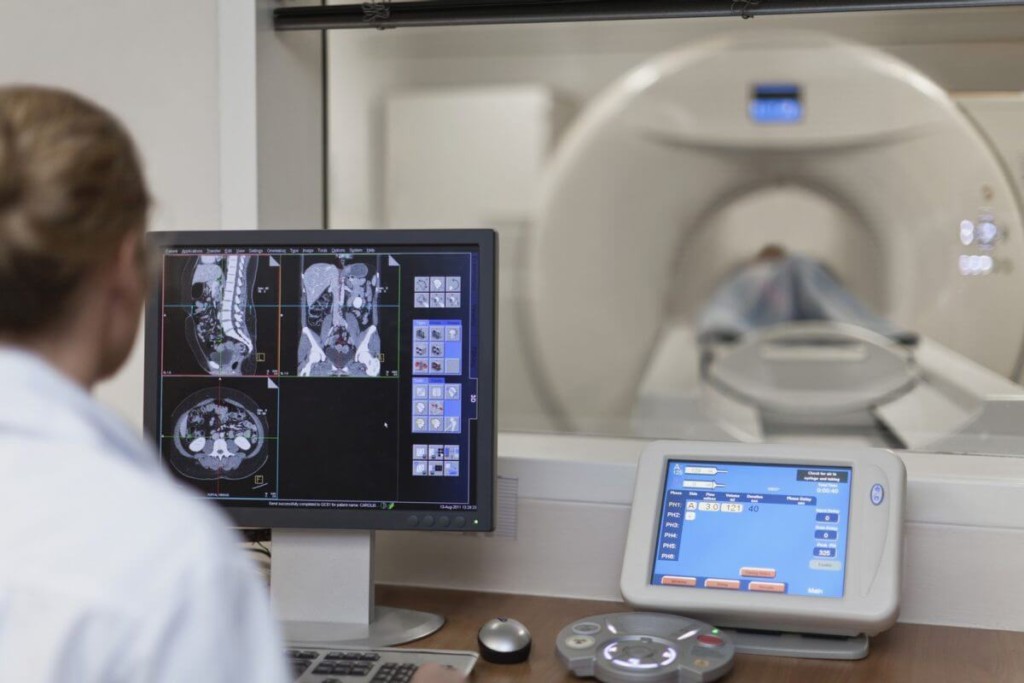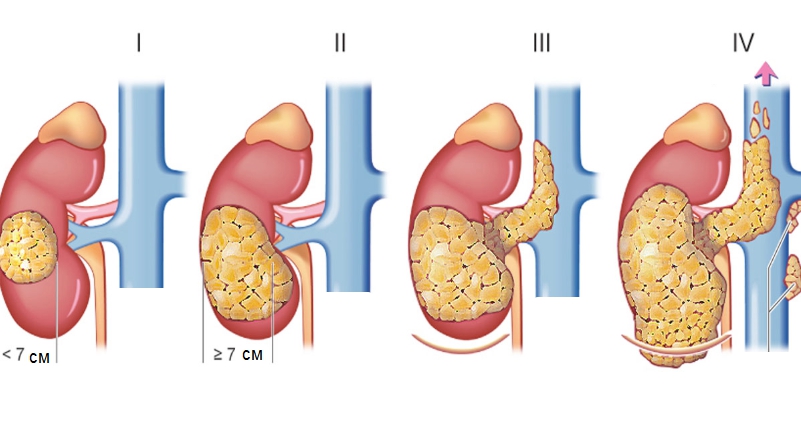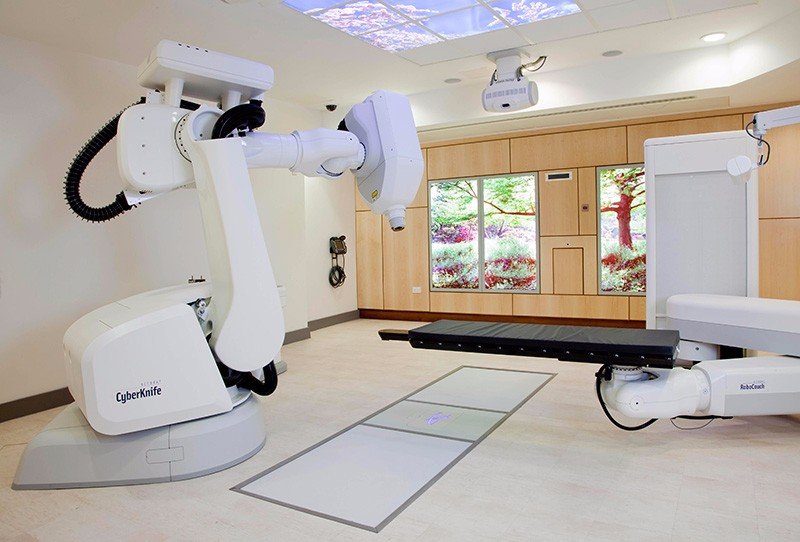Calls for Ukraine
Calls for Europe
Calls for USA

Kidney cancer is a malignant tumor that develops in the lining of the tubules or other areas of the kidneys. Renal cell carcinoma (renal adenocarcinoma) accounts for about 90% of cases. The danger of the disease lies in its rapid spread throughout the body – through the bloodstream and the lymphatic system. If treatment is not started on time, metastases will reach distant structures, which will worsen the prognosis of survival. In the early stages, kidney-sparing surgery is possible.
Scientists still cannot identify the exact cause of kidney cancer in children and adults. The main risk factors for the development of the disease include:
Studies have confirmed that kidney cancer is diagnosed in people who work in industries associated with carcinogens. Substances harmful to health (cadmium, asbestos) are found in aniline dyes.
At an early stage, kidney cancer does not manifest itself as tangible changes in well-being. There are kidney cancer symptoms that are most commonly seen in patients:
Where does kidney cancer hurt?
In the later stages, patients complain of intense bone and joint pain. Often these symptoms are combined with severe back discomfort in the kidney area.
When the tumor grows in size, it leads to the appearance of another symptom – the appearance of a lump in the abdomen. People with thin builds may themselves notice swelling in the abdominal region. Such a manifestation of the disease requires an immediate visit to an oncologist.

Doctors of specialized clinics always conduct examinations, which include laboratory tests, various tests and hardware screenings. Kidney cancer treatment in Turkey, South Korea, Israel and Europe is not prescribed without accurate diagnosis.
How to identify kidney cancer during medical examinations:
Examples of PET-CT prices for kidney cancer abroad:
What tumor marker shows kidney cancer?
Tumor markers are specific proteins that are elevated as cancer develops. The indicator of tumor markers can be increased even in the absence of cancer. Therefore, in advanced foreign clinics, such tests are used as an auxiliary, and not as the main diagnostic method.
A tumor marker is taken before starting treatment, this figure is recorded. If the tumor turns out to be malignant, the data is used as a control of the success of chemotherapy – to take a test once a month or once a month and a half, and if the indicator grows, the drugs are changed.
Types of tumor markers for kidney cancer:
Kidney cancer survival at different stages:
How long they live with grade 4 kidney cancer depends on the individual characteristics of the organism and the sensitivity of the tumor to therapy. In the CIS countries, the survival rate for stage 4 kidney cancer does not exceed 1%. Foreign doctors are introducing new types of treatment that allow patients to live at least 5 years in 8% of cases at the very late stage of the disease.

Specialists diagnose kidney cancer according to four stages of the disease. Each stage is characterized by its own signs and degree of damage to neighboring and distant structures.
Kidney cancer stage 1
The tumor size is up to 7 cm, there is no metastasis, cancer cells are localized exclusively in the renal tissue.
Kidney cancer stage 2
Malignant tumor more than 7 cm (the size of a small apple), does not go beyond the organ.
Kidney cancer stage 3
The tumor may not extend beyond the renal capsule, but spreads to the adrenal gland or perinephric tissue. Also, the neoplasm can spread into the renal and vena cava.
Kidney cancer stage 4
The tumor invades the renal capsule. Kidney cancer spreads to almost all organs and tissues. Most often metastases are found in the lungs, liver, bones.

The main treatment for kidney cancer is surgery. During surgery, the doctor removes the tumor as much as possible and, if possible, preserves the kidney. At the same time, the body continues to function. It is more difficult to carry out such an operation than to completely remove a kidney affected by cancer. For this, the doctor must be highly qualified and have modern surgical equipment.
In the practice of foreign clinics, specialists use 5 types of procedures how to treat kidney cancer:
Clinical trials are ongoing for innovative treatments for kidney cancer. In hospitals in Turkey, Israel, Germany and a number of other countries with developed medicine, patients have the opportunity to take part in such studies.
Surgical treatments for kidney cancer:
How is kidney cancer treated if surgery is not possible?
When surgery to remove a tumor is not possible, doctors perform arterial embolization. To do this, a small incision is made and a catheter (thin tube) is inserted into the main blood vessel that leads to the kidney. Small pieces of a special gelatinous sponge are inserted through the catheter into this vessel. Sponges block blood flow to the kidneys and prevent cancer cells from receiving oxygen and other substances necessary for tumor growth. This procedure is carried out by experienced doctors of foreign clinics.
Radiation therapy
It is a non-surgical treatment for kidney cancer that uses high-energy X-rays or other types of radiation to kill cancer cells. External radiation therapy is used outside the patient’s body to direct radiation directly to the tumor. External beam radiation therapy for kidney cancer can be used as palliative care to relieve symptoms and improve the quality of life of a patient with cancer.
Kidney cancer chemotherapy
Chemotherapy drugs are prescribed to slow the growth of cancer cells (before surgery), or completely destroy them (after surgery). When a patient takes drugs orally, intramuscularly or intravenously, the active ingredients enter the bloodstream and can reach cancer cells throughout the body – this is systemic chemotherapy.
Immunotherapy
The use of immunotherapy drugs stimulates the patient’s immune system to fight kidney cancer. Special substances enhance the body’s natural defenses against cancer cells.
A properly selected treatment program improves the prognosis of survival and gives a chance for a complete cure. It is important that such a program is drawn up by an experienced oncologist. The equipment of the clinic where the patient is undergoing kidney cancer treatment gives doctors more opportunities to carry out complex therapy using safe and effective equipment. As a rule, the ideal combination of all these parameters is available in foreign hospitals, where treatment is carried out according to modern international protocols, taking into account the stage of cancer.
Stage 1 kidney cancer treatment program
Removal of a malignant tumor while preserving the kidney. Doctors perform nephrectomy in one of three ways: abdominal surgery, laparoscopic, or using a Da Vinci robot (low-traumatic surgery, which is performed strictly according to indications). Treatment is complemented by radiation therapy. Arterial embolization is possible.
Stage 2 kidney cancer treatment
Removal of the kidney with adjacent fatty tissue, sometimes together with the adrenal glands, adjacent vessels and regional lymph nodes. Most often, doctors supplement treatment with radiation therapy and arterial embolization.
Stage 3 kidney cancer treatment
Removal of the kidney with adjacent fatty tissue, adrenal glands, adjacent vessels, lymph nodes. Radiation therapy courses are prescribed before and after the operation.
Stage 4 kidney cancer treatment
Radical nephrectomy, metastasectomy (removal of the kidney and tumors in other organs) in combination with chemotherapy, targeted and immunotherapy. To reduce pain and improve the quality of life, doctors give the patient a course of radiation therapy.
When choosing a clinic for the treatment of kidney cancer, you need to pay attention to the equipment of the medical institution. Modern medical technologies allow surgeons to effectively perform kidney surgeries so as to minimize the likelihood of recurrence of the disease.
Kidney cancer surgery on Da Vinci
When it is possible to carry out operations in a minimally invasive way, doctors use the Da Vinci robot-assisted surgical installation. Doctors use robotic interventions as an alternative to traditional open surgery. This reduces the risk of bleeding, infection, damage to healthy tissues and reduces pain after the intervention.
The operation with the help of Da Vinci goes through 5 small incisions of 1-1.5 cm. The incision in open surgery is 12-15 cm. As a result, the patient recovers faster than after open surgery.
Nano Knife for kidney cancer treatment
This is a procedure that is performed during surgery. During this operation, doctors use electric current to destroy cancer cells in soft tissues. The Nano Knife allows doctors to destroy tumors in hard-to-reach places.
The use of the Nano Knife in kidney cancer allows doctors to destroy cancer cells as efficiently as possible without harming healthy tissues of the body. This procedure prolongs the patient’s life, in some cases a complete remission is achieved.
Radiosurgery for kidney cancer
CyberKnife is a radiosurgical system for the precise irradiation of tumors. Doctors use this robotic system as an alternative to traditional surgery when it is impossible to remove a tumor.
According to research published in the National Center for Biotechnology Information, up to 40% of patients after kidney cancer treatment with Cyberknife achieve complete remission.
The cost of treatment in foreign clinics will depend on:
Also, the total cost of treatment is influenced by the patient’s condition, the stage of kidney cancer and concomitant diseases. To carry out complex therapy, may need several methods of treatment and consultations of other narrow-profile specialists.
Examples of the cost of kidney cancer treatment in clinics abroad:
The disease spreads wherever renal cancer metastases. This happens through the blood or lymph, which carries cancer cells to all organs. Extensive metastasis of the body is fatal.
How many years you can live with kidney cancer depends on the stage of the disease at which treatment was started. The earlier cancer is detected, the better the chances of complete remission. Kidney cancer at stages 1-2 responds well to treatment and many patients live at the turn of 10 years.
How long they live with stage 4 kidney cancer depends on the prescribed methods of treatment and the individual body’s response to medications. According to international statistics, approximately 8 out of 100 patients live at the turn of 5 years.
The most reliable results can be obtained thanks to laboratory tests, genetic tests, tumor markers and instrumental studies. According to the practice of the leading oncological clinics in Turkey, South Korea, Israel and Europe, only complex diagnostics can accurately establish the stage of kidney cancer.
In modern medicine, special programs have been developed for the treatment of kidney cancer at different stages. In countries with the most developed medicine, a patient with oncology always has a better chance of getting rid of the disease completely. This is due to the access of foreign hospitals to innovative drugs, treatment with high-quality equipment and extensive clinical experience of oncologists.
Clear cell carcinoma of the kidney histologically complements the following types of renal cell carcinoma:
The disease develops in the filtering reabsorbing tubules of the kidneys. If the disease is detected in the early stages, it responds well to treatment. In clear cell kidney cancer, survival at 5 years is achieved in 90% of cases. The main method of treatment for clear cell kidney cancer is surgical removal of the tumor and various types of therapy.
One of the subtypes of cancer is clear cell hypernephroid renal cancer. For the treatment of this type of cancer, foreign oncologists often use radiosurgery. This avoids the need for lifelong hemodialysis.
The disease spreads wherever renal cancer metastases. This happens through the blood or lymph, which carries cancer cells to all organs. Extensive metastasis of the body is fatal.
How many years you can live with kidney cancer depends on the stage of the disease at which treatment was started. The earlier cancer is detected, the better the chances of complete remission. Kidney cancer at stages 1-2 responds well to treatment and many patients live at the turn of 10 years.
How long they live with stage 4 kidney cancer depends on the prescribed methods of treatment and the individual body’s response to medications. According to international statistics, approximately 8 out of 100 patients live at the turn of 5 years.
The most reliable results can be obtained thanks to laboratory tests, genetic tests, tumor markers and instrumental studies. According to the practice of the leading oncological clinics in Turkey, South Korea, Israel and Europe, only complex diagnostics can accurately establish the stage of kidney cancer.
In modern medicine, special programs have been developed for the treatment of kidney cancer at different stages. In countries with the most developed medicine, a patient with oncology always has a better chance of getting rid of the disease completely. This is due to the access of foreign hospitals to innovative drugs, treatment with high-quality equipment and extensive clinical experience of oncologists.
Clear cell carcinoma of the kidney histologically complements the following types of renal cell carcinoma:
The disease develops in the filtering reabsorbing tubules of the kidneys. If the disease is detected in the early stages, it responds well to treatment. In clear cell kidney cancer, survival at 5 years is achieved in 90% of cases. The main method of treatment for clear cell kidney cancer is surgical removal of the tumor and various types of therapy.
One of the subtypes of cancer is clear cell hypernephroid renal cancer. For the treatment of this type of cancer, foreign oncologists often use radiosurgery. This avoids the need for lifelong hemodialysis.
Please rate the work of MedTour
